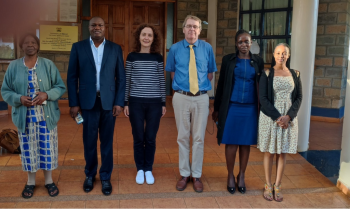The Sustainable Water Pan Project spearheaded by the Project Principal Investigator Dr. Frank Masese and the co-principal investigator Prof. Hellen Ipara hosted their partners from IHE-DELFT Institute for Water Education from the Netherlands at the University of Eldoret on Friday, 22nd September, 2023. The team comprised Professor Ken Irvine a renowned professor of Aquatic ecosystems at the IHE DELFT who holds vast experience of the global challenges facing water and habitat quality on a range of lakes and catchments in Europe and Africa and Dr. Konstantina Katsanou, a Lecturer in Applied Aquatic Ecology at IHE Delft with vast knowledge on karst hydrogeology and hydrochemistry got to meet the University Vice-Chancellor, Prof. Thomas K. Cheruiyot for a courtesy and discussion of the project activities with the project team and PhD students benefiting from it.
The project is hosted at the University of Eldoret, department of Fisheries and Aquatic Sciences with three PhD students benefitting from the project as below.
- Elizabeth Wanderi: A PhD student fellow on Water pans and Biogeochemistry. Her research will increase the understanding of natural processes in water pans driven by hydrology, catchment character, biogeochemistry, and pathogen dynamics.
- Edith Jepchirchir Kurui: A PhD student fellow on water pans and public health. Her research will contribute to the understanding of health risks linked to water use and social practices using the one-health approach.
- Joy Kaino: A Ph.D. student fellow on water pans as Social–Ecological–Technological Systems (SETS). Her research will increase the understanding of social dynamics in the use and operation of water pans and its links to socio-economic inclusion and marginalization.
The Ph.D. students’ projects aim at understanding the biogeochemistry of water pans, the role of water pans in improving animal, human, and or environmental health using the one health approach concept, and the water pans as social-ecological-technological systems.
The meeting ended with a supervisory meeting between the University of Eldoret project team and the IHE DELFT guests who advised the students on their research proposal and research areas of interest for the project.
About the Project
Sustainable water pan project is an internationally funded project, which aims to improve the design and management of rural water pans, to increase the sustainability, climate resilience, and quality of water supplied to rural communities in Kenya and Tanzania. Kenya is 80-89% water-scarce country. To enhance water-harvesting technologies, excavation of earth to harvest rainwater runoff has been adopted by national, county, and non-governmental organizations to increase water access and availability in arid and semi-arid lands. Water pans play hidden and underestimated functions in achieving universal access to safe and affordable water. Since 2015, the number of people without safely managed drinking water in sub-Saharan Africa has increased from 703 to 766 million, and 8 out of 10 live in rural areas. In water-scarce areas, constructed or natural water pans store seasonal rains and frequently act as the only water source for households, livestock, and wildlife. Moreover, as populations grow and settlements expand around rivers and lakes, water pans can shorten long, physically onerous walks, of mostly women and children, to fetch water. However, current approaches to constructing and operating water pans in the region face a number of interconnected challenges.
Benefits of the project to the University of Eldoret
The water pans project is beneficial to the university and the entire project team in the following ways:
- Capacity building: The IHE and University of Eldoret water pans project team aims to strengthen the research skills and methodologies employed in aquatic ecosystems utilizing scientific, innovative, and participatory research methods. This will ensure that the indigenous knowledge in aquatics is converted to scientifically viable information and products.
- Exchange program: The project offers virtual programs where the entire research team and the project beneficiaries interact on a monthly basis sharing crucial ideas pertaining to the challenges and innovative solutions towards the complete implementation of the project.
- Research development and training: The project offers full scholarships (tuition and research) to three students from marginalized communities to pursue their PhD studies. It also ensures that laboratory equipment, research conferences, and professional development courses are sponsored for students and staff in the project to enhance their skills and career advancements.
- Addresses social issues; Water scarcity is an eminent issue in Kenya and East Africa in general. Through the project, the university will be able to address the challenges surrounding the use of water pans and their quality especially by the marginalized communities.
- Informing public policy: The project is beneficial since the findings will be used to inform the policy-making decisions on issues pertaining to water pan design, rainwater harvesting technologies, and the use of shared water resources among the communities to improve their health.

